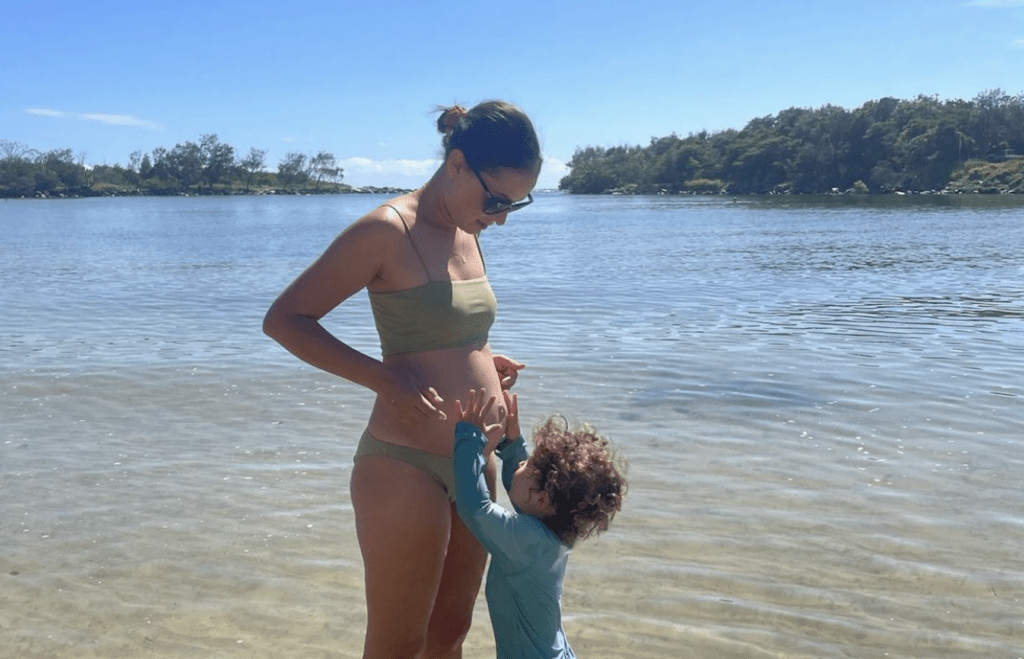As that second line grew clearer on my Rapid Antigen Test a fortnight ago, a deep wave of anxiety rolled over me.
Up till then, my symptoms had been mild: a bit of a stuffy nose, slightly aching sinuses, tiredness and itchy eyes. I attributed the itchy eyes to hay fever and the rest of it to pregnancy.
I was sure it wasn’t COVID.
But there was that second line, as clear as day, illuminated by my mini test torch.
Within a day, my symptoms were far more severe. I was now exhausted. A simple trip to the kitchen to retrieve a glass of water felt like a marathon. My breathing was more laboured with tight congestion and headaches that rippled through my temple and neck. A fever delivered dreams Tarantino would have lauded, as nausea roiled over me for two days.
It didn’t feel like a bad cold, it felt like a potent virus. But god, was I grateful to be immunised.
At 5 weeks pregnant, I made the decision to get my second vaccination against COVID-19 having received a first shot of AZ 12 weeks prior. While my decision was ultimately not a challenging one, I’d be lying if I said it was made with zero internal conflicts.
That’s because pregnancy is a fraught time. As prospective mums, our sole mission is to do everything in our power to deliver a healthy baby but with so many curve balls thrown at us from the moment we see that second line on a pregnancy test, things are tense.
We avoid certain foods, supplements and medications. We stop drinking, cut out strenuous activity, and stress. We even stop sleeping in positions that feel most comfortable, lest our baby’s blood flow be restricted. At times it feels like we’re ticking time bombs. The slightest wrong move could prove disastrous– it’s a very high stakes game made worse by the fact that you’re the only one playing.
It’s little wonder why so many pregnant women reject the COVID vaccination. After all it seems counter intuitive to stick a foreign substance in our bodies when we’re working so hard to stay clean and healthy.
But this take, while completely understandable, is dangerous beyond measure.
Obstetricians are alarmed by the number of pregnant women still not vaccinated against the virus, with cases of Omicron skyrocketing and NSW delivering its deadliest day of the pandemic so far. Health professionals say they are concerned misinformation is wrongly leading women to believe the vaccine is not safe during pregnancy.
Prof Michael Chapman, the clinical director of women’s and children’s health at St George hospital in Sydney surveyed 22 women in the hospital’s postnatal ward who had just given birth in September. Just three were fully vaccinated, while 14 women had received one dose.
He then surveyed 60 women who came through the hospital’s antenatal clinic over the course of a morning on September 21, and found 38 percent had not started the vaccination process. A similar number of women (30 percent) were completely unvaccinated when he repeated the survey in the clinic in November.
Currently, I live in Northern NSW, around 25 minutes from Byron Bay, where vaccine hesitancy is highest. I know several women, many of them friends, who have opted not to be vaccinated during pregnancy. It’s deeply unnerving, especially after my own experience of contracting it.
Because the truth is, I know that had I not been double vaccinated against COVID, my situation would have been far worse. I would have ended up in hospital. I could have ended up with long term health impacts. My baby could have died.
Following a new study that shows unvaccinated women’s risk of having a stillbirth is four times higher, doctors are pleading for women to get jabbed as soon as possible. A University of Edinburgh study found that pre-term births, stillbirths and new-born deaths are more common among women who have the virus 28 days or less before their delivery date. Imagine going through the countless trials and tribulations of the last nine months only to have the most horrific, heartbreaking conclusion?
Pregnancy is a stressful, anxiety-laden time. We are all trying to muddle through to do the right thing. But having the COVID-19 vaccine is safe. And it’s the best thing we can do to defend ourselves and our babies from a virus that’s now out of control.


